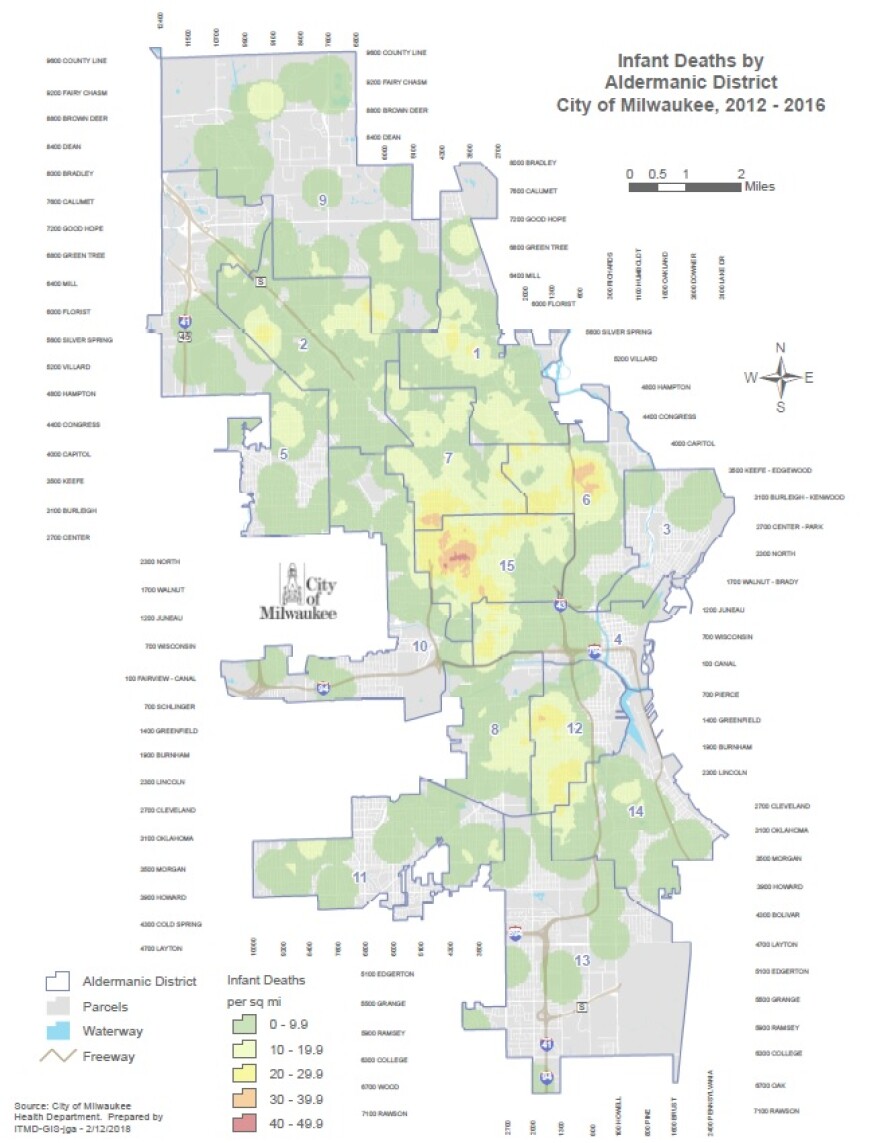Some Milwaukeeans are raising new concerns about the potential health risks associated with lead. Critics point to a cluster of infant deaths in the 15th Aldermanic District and think contaminated water might be to blame.
Sherrie Tussler, executive director of Milwaukee's Hunger Task Force, says it’s her job to make sure kids eat healthy food, not to talk about infant mortality. But earlier this year – on Valentine’s Day to be exact, Tussler says she learned something startling: “40 to 49 infant deaths occurred along North Avenue from 2012 to 2016."
Tussler thinks the cause might be lead in water. That's because of a map she obtained after a Common Council committee meeting last January.
“I listened to the Milwaukee Water Works talk about heat maps that it had that were related to the location of lead service laterals... and wondered what an infant mortality heat map would look like,” she explains.
The results, Tussler says, left her numb.

She says normally heat maps result in blobs of concentrations, but the infant mortality map “shows a line rather than a blob" - showing an extremely concentrated area.
"And what I had recalled," Tussler says, "was that North Avenue had been under construction... the roads, the curbs, the sidewalks along North Avenue around 2009."
When lead lateral pipes are jarred by nearby pounding and heavy equipment, lead levels in water flowing through those pipes can spike. That’s now common knowledge and since January 1, 2017, the city’s policy is to replace the entire service line. Filter distribution also figures into the protocol as well as “specialized outreach.”
But that wasn't the case during the years in which at least 40 infants died in the within blocks of the road construction project.

Tussler believes it's possible babies may have died because of residual lead poisoning in their mothers' bodies. “If a woman gets lead poisoned – she will store lead in her bones. If she becomes pregnant, lead is released from her bones to the fetus – she doesn’t know she’s toxic because she hasn’t been tested. Some of these infant deaths could be related."
Tussler says she's determined to find out whether the construction is connected to the deaths. She's met with several aldermen – including Common Council President Ashanti Hamilton.
Tussler shared this email Hamilton sent to her on March 30 with WUWM:
“I shared your concerns with the MHD (Milwaukee Health Department)….I want you to know that we take this issue very seriously and will do all we can to get things moving toward a solution. I will follow up when I have more...”
Yet Tussler says weeks have gone by without hearing anything from the Common Council. She says Milwaukee families can’t afford to wait. “We need to let parents of infants know, parents of kids up to age 6 know, and women of childbearing age that they should not drink from unfiltered sources."
President Hamilton was not available for an interview for this story.

Tussler and others brought up the concerns Monday, when Milwaukee's interim health commissioner Dr. Patricia McManus appeared at the monthly meeting of the nutrition & lead task force.
McManus said she hadn't laid eyes on the infant mortality information, and added she has her hands full addressing fundamentals – not the least of which is reestablishing the community’s trust in the department.
“I’m trying to get the department support in what they do – as long as they do it like they’re supposed to. And let them understand that we are servants to the people in this community,” she said. “It’s not the other way around.”
When McManus took the helm in mid-February, she stepped into a health department plagued by mismanagement. Its previous commissioner, Bevan Baker, suddenly resigned.
After the meeting, McManus agreed the infant mortality data needed further study.
“Do I think it ought to be looked at? Absolutely. Can we do it right now? No,” McManus said.
She noted that when Milwaukee does take a systematic look at infant death, it must be thorough to determine if correlation and causation intersect. “They’ve got lead laterals in Story Hill and in the suburbs, and you don’t have the lead poisoning. So can it then be seen as an agent that could make it worse? Yes, as a factor. But actually killing takes it to another level. As a researcher myself, it’s very hard to say ‘it causes death,'" McNanus said.
Have an environmental question you'd like WUWM's Susan Bence to investigate? Submit below.
_





